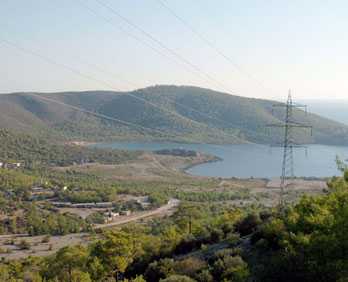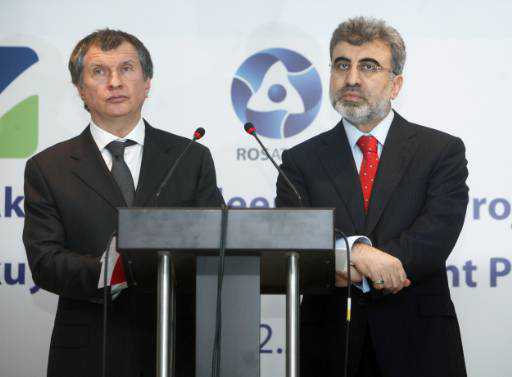By Jacob Resneck – Special to The Washington Times
The skyline of Istanbul, Turkey’s largest city, rises above the Bosporus. (AP … more >
- comdirect Girokonto +50€Aktivitätsprämie. Ohne Mindest- Geldeingang. Girokonto eröffnen! www.comdirect.de/Girokonto
Story Topics
- Environment
- Turkey
- Russia
- Foreign Policy Studies In Istanbul
- Sinan Ulgen
AKKUYU, Turkey — Russia and Turkey, which were Cold War adversaries, are finding common ground on energy despite ongoing diplomatic disputes.
Turkey has agreed to allow Russia’s South Stream gas pipeline to cross its territorial waters, and Russia is investing $20 billion to construct Turkey’s first nuclear power plant.
The deals have been made even while Turkey criticizes Russian support for Syrian President Bashar Assad and Moscow fumes over a NATO early-warning radar system in Turkey.
“These are countries that have been able to compartmentalize their differences,” said former Turkish diplomat Sinan Ulgen, chairman of the Center for Economics and Foreign Policy Studies in Istanbul (EDAM).
“It has been a relationship driven by mutual economic gain.”
Gas- and oil-producing giant Russia has enlisted Turkish support for its proposed South Stream pipeline to diversify its access points to European markets.
One of the world’s fastest-growing economies, Turkey has significant energy needs. The majority Muslim nation’s energy demands will double by 2023, according to one projection.
But Turkey cannot do it alone and has sought international partners to build, own and operate a nuclear plant.
Only Russia has come forward and is constructing the Akkuyu nuclear power plant on the Mediterranean coast near the southern city of Mersin. The plant’s design calls for four 1,200-megawatt reactors scheduled to go on line in 2019.
The $20 billion venture will be wholly financed by a subsidiary of Rosatom, Russia’s state-controlled nuclear energy corporation.
Unprecedented cooperation
The Russian firm has agreed to build, own and operate the plant for its entire productive life, with spent fuel sent to Russia for reprocessing. The deal represents an unprecedented level of cooperation between the former adversaries.
“We are the nearest neighbors with Turkey, and we should trust each other,” said Rauf Kasumov, a spokesman for Akkuyu NGS, the Russian company that will own and operate the plant. “Logically, Turkey needs that. It’s one of the fastest-growing economies of the world, and they need it badly.”
Questions linger about what would become of the core waste leftover from the plant, a perennial controversy whenever a reactor is to be built.
“That is a decision to be done later between the Turkish republic and the Russian Federation,” Mr. Kasumov said.
Under terms of the agreement signed in 2010, decommissioning will be funded by a cent-and-a-half levy on each kilowatt hour sold over the plant’s 60-year productive life span.
Critics such as Erhan Kula, an economics professor of Bahcesehir University in Istanbul, say that relies on vague assumptions on what the long-term costs will be.
“The most important thing [regarding] nuclear power is the decommissioning and storage of highly toxic waste,” Mr. Kula said. “There’s just a couple of sentences in the environmental assessment report, which is mind-boggling.”
Mr. Kula said the 4,800 megawatts produced by the four reactors would provide only about 5 percent of Turkey’s energy needs and that the current grid is losing more than 14 percent to theft.
“If we stop that, we don’t need nuclear power,” Mr. Kula said.
However, A. Beril Tugrul, director of the Energy Institute at Istanbul Technical University, said Turkey’s energy needs are rising, and nuclear power, with all its risks, is an essential alternative to burning fossil fuels.
“I think many of the problems [with decommissioning] can be solved — but maybe not,” Ms. Tugrul said. “But it’s not just nuclear power that has problems. All plants have huge problems with carbon dioxide and greenhouse gases.”
Even EDAM’s study, which found that the agreement could work in Turkey’s favor, cautions that Ankara has failed to lay the groundwork for proper oversight of atomic energy.
“Turkey is rushing toward nuclear power,” Mr. Ulgen said. “Turkey does not currently have the regulatory capacity to minimize the risks inherent in nuclear power.”
Officials at the Turkish Ministry of Energy and Natural Resources did not respond to requests for comment.
Turks fear nuclear power
Turkish officials have been eyeing the Akkuyu site since the 1970s, but it has been only in recent years that the project has taken shape.
Nuclear power in Turkey has generated little debate, though the most exhaustive study conducted shows broad public skepticism.
Memories of the 1986 Chernobyl meltdown in Ukraine, which irradiated parts of Turkey’s Black Sea region, may help explain why 62.5 percent of the more than 2,400 people surveyed said they are opposed to nuclear power, making it the second-least popular choice after coal.
“If they listened to what people say, they shouldn’t go nuclear. Turks are very scared of nuclear power,” Mr. Kula said.
The survey was conducted in 2007, and the Fukushima Daiichi disaster in Japan last year has further sullied nuclear power’s reputation, he said.
Organized opposition has been limited. The site is relatively undeveloped, but road access along the craggy cliffs that tower above the Mediterranean has been upgraded.
This summer, a small tent encampment was erected in protest to raise awareness as grass-roots groups lodge legal challenges.
Opposition groups — backed by the main opposition Republican People’s Party (CHP) — argue that the site is crisscrossed by active earthquake fault lines. Court challenges have been lodged against the site plan, but the government has not stopped construction.
“We are going to both challenge the government and draw the public’s attention through direct action,” said Sabahat Aslan, one of the protest leaders at the encampment.
Meanwhile, another site on the Black Sea coast has been identified for a second plant, but the Turkish government has been unable to find an international partner willing to build it.
Turkey has been in talks with China, Canada, South Korea and Japan to replicate a deal similar to Russia‘s.
Mr. Kasumov, the Akkuyu NGS representative, said it is unlikely that another country would be willing to invest as heavily as Russia has.
“I really doubt that any other country would be in the position of financing the [build-own-operate] model. It’s pretty expensive,” he said.diplomat Sinan Ulgen, chairman of the Center for Economics and Foreign Policy Studies in Istanbul (EDAM).
“It has been a relationship driven by mutual economic gain.”
The Russian commitment to the project appears unshakable publicly, but the Turkish press has raised questions about Moscow’s willingness to spend vast sums as cost projections rise.
The project’s future depends largely on the good will of the Russian government and its faith in Turkey as a strategic energy partner.
“They really need to commit the $20 billion,” said Mr. Ulgen of EDAM, “and there is no clear penalty in the agreement if they don’t.”
Read more: New energy between Cold War foes Turkey, Russia – Washington Times https://www.washingtontimes.com/news/2012/sep/3/new-energy-between-cold-war-foes-turkey-russia/#pagebreak#ixzz25WnBI5Nn
Follow us: @washtimes on Twitter




